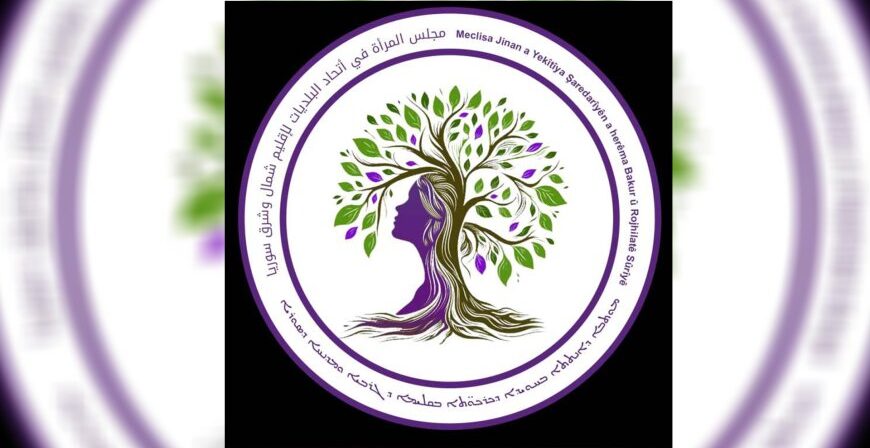Women in North and East Syria have proven their ability to manage municipal institutions and participate actively in decision-making, supported by a unified internal system that strengthens their organization across the different regions—from service committees to leadership roles.
Over recent years, the regions of North and East Syria have witnessed significant social and political changes, most notably the growing role of women in municipal and service work. This shift is part of a democratic, emancipatory project aimed at building a pluralistic society rooted in equality and social justice under a system of direct democracy.
The municipal experience in North and East Syria began in Qamishlo, in Jazira Canton, where the first municipality, under the name “The People’s Municipality,” was established on December 10, 2012, marking a new phase in managing and providing local services.
In 2015, the Municipalities Law was officially approved, mandating the application of the co-chair system—shared equally between men and women—in all municipalities. This marked a pivotal step toward ensuring women’s active participation in managing local institutions and shaping public decision-making.

In this context, spokesperson for the Women’s Council in the Union of Municipalities of North and East Syria, Fatima Ibrahim, spoke to ANHA Agency about the pioneering journey of women in municipal work from 2015 to 2025. She highlighted the major transformations that followed the first Women’s Municipalities Conference in 2016, which constituted a turning point in establishing a women-specific system within municipal institutions.
From organizational beginnings to building women’s system
Fatima Ibrahim said: “Women began their first steps through service committees within communes. Over time, their participation expanded to include all departments of the municipalities—from services to administration. This was the first step toward breaking traditional barriers and proving their ability to perform tasks with high efficiency.”
She added that the first Municipal Women’s Conference in 2016 served as a key turning point, where the initial foundations were laid for building a dedicated women’s system inside municipal institutions, paving the way for broader participation in management and decision-making.
“Since then, women’s work in municipalities has developed significantly,” she continued. “Women now participate actively in all service and administrative committees, reaching leadership positions. With each passing year, women have become a strong and influential force within municipal work.”
In 2025, the second Women’s Municipal Work Conference was held in Hasakah, producing several notable outcomes—most importantly, the approval of the internal regulations for the Women’s Council in Municipalities. This step was essential in unifying women’s work across the different regions and strengthening their role within the municipal structure.
Structure of women’s work within municipal internal system
Women’s work is organized under a comprehensive structure within the new internal system of the Union of Municipalities in North and East Syria. The system connects the Women’s Office and the Women’s Council.
A Women’s Office is established in major cities depending on the number of women working within the municipalities. Its role centers on local organization, training, and monitoring women-focused projects.
The Women’s Council is formed in both urban and rural municipalities. It consists of a chair, deputy, and spokesperson, and is responsible for all organizational, supervisory, and training aspects related to women’s work. It oversees all women’s projects within the municipalities to ensure unity, organization, and efficiency.
This structure ensures that both the office and the council operate in a complementary way, distributing responsibilities in a manner that allows women to participate effectively at all levels of municipal administration in both cities and villages.
After the internal system was approved, work began under the unified name Women’s Council in the Union of Municipalities of North and East Syria, to be applied across all regions. Its aim is to strengthen women’s participation in municipal work at every level.
Goals, tasks of council

The council’s goals and tasks include:
Enhancing cooperation and support for women in municipalities through regular organizational meetings.
Launching projects dedicated to women’s work and supporting initiatives that encourage women’s participation in society.
Organizing training and qualification courses to strengthen administrative and community service skills.
Participating in all activities against violence towards women and promoting their social role.
Maintaining direct relations with communes to help resolve community issues.
Achievements in 2025
Throughout the current year, the Women’s Council completed several development projects, including:
– Operating multiple bakeries
– Opening sewing workshops
– Establishing women’s housing associations
Opening sweets shops and tree/flower nurseries
Fatima Ibrahim added: “These projects support and empower women economically and socially by providing job opportunities, professional training, and psychological and social support.”
She concluded by emphasizing:
“These projects are not temporary—they are part of a long-term plan aimed at building a cohesive society in which women play an active role in all sectors.”

